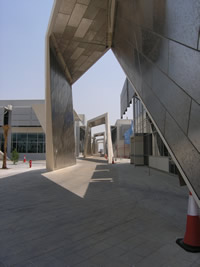Plenary Speakers at this year's Conference:
![]()
Dr. Stephen Bax
Dr Stephen Bax is Principal Lecturer at Canterbury Christ Church University in England. He started work as a language teacher in Sudan, then went to study Arabic in Damascus and has since worked in 12 Arabic countries, as well as in Africa and Asia. He has published extensively on language teaching methodology, on ICT and on discourse and sociolinguistics.
Plenary: Teaching English in the Arab World: Challenges and Solutions
Summary: This talk draws on a range of contexts across the Arab world, including Qatar, and examines a number of issues which frequently affect the teaching and learning of English. I try to identify ways forward in an effort to promote more effective learning and teaching, taking the learning context into account as fully as possible.
Workshop: Classroom Practice
This workshop examines some real classrooms from the Arab world and elsewhere and discusses a number of factors which can lead to classroom success and failure. It aims to generate discussion and views as to how better we as teachers can guide classroom activity so as to generate better outcomes.
Dr. M. Sue Sroda
M. Sue Sroda received her MA and PhD in Linguistics from the University of South Carolina. She is currently an Associate Professor of English and Graduate Coordinator of the MA in Teaching English to Speakers of Other Languages Program at Murray State University, Kentucky, USA. She has 10 years experience in ESL and EFL teacher training and professional development. Her areas of research include integrated skills methodologies, pragmatics, and CALL.
Plenary: Integrated Testing, Integrated Teaching: Making the Transition
The development and implementation of standardized tests such as the internet-based TOEFL has refocused attention on teaching integrated skills in the classroom. But what is meant by “integrated skills”? This presentation will examine strategies and approaches for realistic ways to help our students prepare for this new generation of assessments.
Workshop: Integrating skills in the EFL Classroom
This workshop takes a case-study approach to give teachers practice in the use and adaptation of integrated skills methodologies and assessment in the context of EFL. Participants will use scenarios and problem sets to create activities and lessons and develop practical ways to determine student achievement and progress within a framework of learning and using multiple language skills.
Dr. Mohammed Abbas
Dr. Mohammed Abbas Ali serves as an EFL Curriculum Specialist at the Ministry of Education in the Kingdom of Bahrain. His main area of interest is teacher development. In 1998 he published a book entitled "Improving Reading Skills", and in 1992 received an Outstanding Teacher's Award from the late Head of State Shaikh Isa Bin Salman Al-Khalifa. He brings experience as a former Senior Teacher of English and a diplomat. Dr. Ali worked for three years as a Cultural Attaché in the kingdom of Bahrain Diplomatic Mission in India. He has published a number of articles about different aspects of English language learning and teaching, and presented papers at a number of international conferences.
Plenary: Becoming a Reflective Teacher
Undoubtedly, becoming an effective teacher requires more than accumulating skills and strategies. From a constructivist viewpoint, teacher learning is described as a process of 'organizing and re-organizing, as well as structuring a teacher's understanding of practice. Teachers are viewed as learners who actively construct knowledge, beliefs and dispositions (Uhlenbeck et al, 2002, p. 243).* Reflective practices can be extremely beneficial process in teacher professional development.
Strategies and approaches for becoming a reflective teacher will be explored. The presentation will feature findings from an empirical research study; along with relevant video segments. In combination of theory and practice, participants will be asked to discuss issues related to reflective teaching and given the opportunity to develop their own action plans. Practical handouts will be distributed.
*Uhlenbeck, A., Verlop, N. and Beijaard, D. (2002) Requirements for Assessment Procedure for Beginning Teachers: Implications from Recent Theories on Teaching and Assessment, Teachers College Record, 104 (2), 242-272.
Workshop: Critical Thinking for Academic and Professional Success
Learning to think critically is a vital lifelong skill with broad applications for both academic and professional success. Critical thinking (C.T.) in general education context, draws heavily on literature and pedagogy from Bloom's Taxonomy, Socratic questioning; and inquiry based learning.
In this practical workshop teachers will be engaged in discussing and trying out some CT activities. Some video segments will be shown and some practical handouts will be given.


 Come to CNA!
Come to CNA!